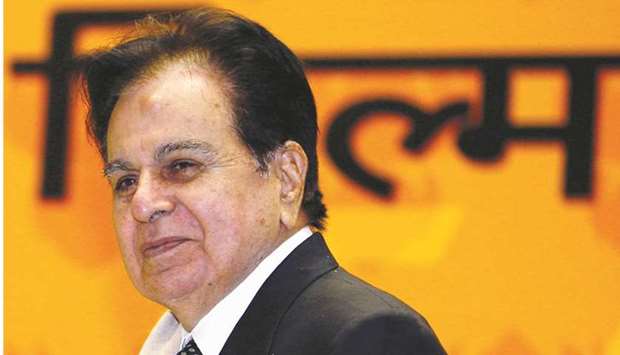Dilip Kumar, who won worldwide fame playing a tragic hero in Bollywood films, died yesterday aged 98 and was laid to rest with state honours in India.
Fans crowded outside the cemetery in suburban Mumbai where the actor’s body was taken, hoping to catch one last glimpse of the star of Devdas and Mughal-E-Azam, whose family had moved from what is now Pakistan when he was a child.
Prime Minister Narendra Modi and his Pakistani counterpart Imran Khan both expressed condolences.
Modi said Dilip Kumar was “blessed with unparalleled brilliance” while Khan said “for my generation Dilip Kumar was the greatest and most versatile actor”.
The veteran actor had been ailing for some time, one of the doctors treating him said. “He had breathing difficulties...We tried very hard. We had hoped he would reach 100,” Jalil Parkar told reporters.
His body was wrapped in the Indian tricolour and a police contingent marched alongside a route lined with fans.
Born Mohamed Yusuf Khan in 1922 in Peshawar, now in Pakistan, he changed his Muslim name to Dilip Kumar for the screen after a suggestion from actress Devika Rani, whose studio, Mumbai Talkies, produced his first film.
He is survived by his wife, Saira Banu, a top Bollywood leading lady in the 1960s and 1970s.
At his residence in Mumbai, Bollywood stars thronged to pay their respects, among them actor Shahrukh Khan, producer Karan Johar and actress Vidya Balan.
Authorities in Peshawar in the province of Khyber Pakhtunkhwa said they were planning to restore the actor’s ancestral home in a narrow lane of the city.
His role as the doomed lover earned him the epithet of “tragedy king” – the man who embodied melancholy on screen.
“An institution has gone..whenever the history of Indian cinema will be written, it shall always be ‘before Dilip Kumar, and after Dilip Kumar’”, actor Amitabh Bachchan said on Twitter.

u201cAn institution has gone..whenever the history of Indian cinema will be written, it shall always be ‘before Dilip Kumar, and after Dilip Kumar’u201d
